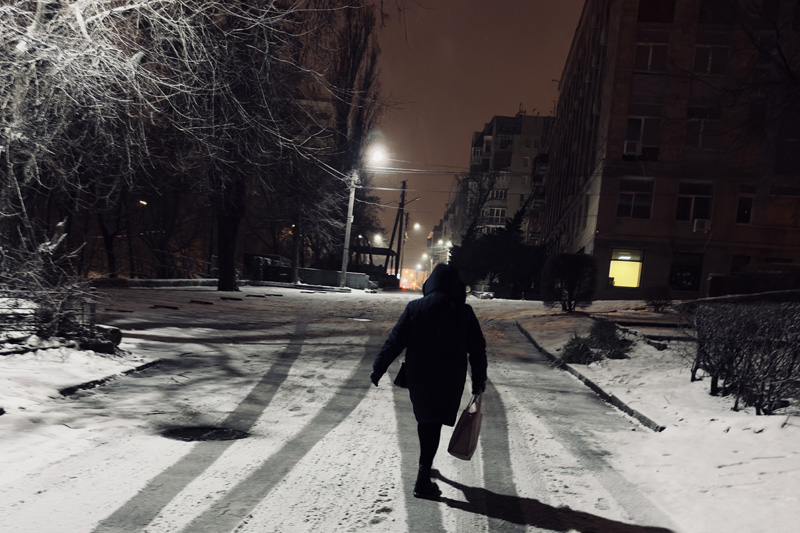USAID Freeze Hits Ukraine Independent Media
Professor Brian Dooley

Saturday 3 May 2025 marks World Press Freedom Day. It’s a tough time for Ukraine’s local independent media, whose ability to provide vital, immediate information to people under fire is severely damaged by funding freezes and cuts by the United States government.
In a series of interviews conducted for Human Rights First along Ukraine’s front on the war against Russia, I spoke to journalists, media outlets and other experts about how the cuts have hit their capacity to report the truth about the war.
When Russia’s April 4 deadly ballistic missile attack on the city of Kryvyi Rih killed 20 people, local media The First Kryvorizkyi (1KR.UA) were there immediately reporting from the scene for local national and international audiences. Apart from covering the details of what happened, it also quickly exposed Russian disinformation about the attack, where half of those killed were children.
But 1KR.UA is one of the media outlets badly hit by the freezing of U.S. funds. “In late February and early March, we received notices of early termination of our agreements with the U.S. Embassy in Kyiv, the IREX, the National Democratic Institute (NDI), and Сhemonics, who implemented the USAID/OTI Ukraine Confidence Building Initiative project in Ukraine,” said Denys Shabanin, 1KR.UA’s Chief Financial and Program Officer at The First Kryvorizkyi.
He says 1KR.UA is the largest independent media outlet in Kryvyi Rih. It reports that last year its website attracted 2.4 million users in 27 million website visits. “We have been operating for over 14 years, and we are a kind of outpost of democracy in our region,” says Shabanin. He says they have grown to a team of 24 permanent employees, providing essential information on the war and other local issues.
The freezes and cuts “have impacted more than 90% of the media budget,” he says. “Advertising and reader support will not cover these costs. We have to understand that stopping U.S. aid will also affect the overall state of the Ukrainian economy and people's well-being, and so their ability to donate to independent media will decrease accordingly."
The freezes and cuts have also hit local media in Ukraine’s northeastern region of Kharkiv, one of the areas hit most by the war. Kharkiv independent media Slobidsky Krai has been serving the community since 1917. Published under various titles for over a century, it now covers news from communities around the region experiencing the war. Its credibility is so strong it was attacked several years ago by Russian propagandists who set up a fake version of its website.
Apart from news, it provides locals with vital information on what medical services and compensation they are entitled to.
Slobidsky Krai Director Larysa Hnatchenko says the USAID suspension has put the editorial office in a critical situation. “We got the letter from USAID on January 28 stopping funds, and according to the grant we were supposed to be reimbursed for money spent, but we haven’t been paid for costs in December or January. We don’t even have money for March salaries.”
“Some of the most important work USAID paid for was printing and distributing free weekly newspapers for communities on the front line, in deoccupied territories and in centers providing humanitarian help,” she said. “This has stopped now.”
The Kharkiv Media Hub was set up by local volunteers following the February 2022 full-scale invasion to help visiting journalists cover the war. It has acted as intermediaries between international reporters and local authorities, organizing access to the front line, providing fixers and translators, offering invaluable local insights, and facilitating press briefings.
It has a strong reputation across the region and beyond as offering efficient help to international media.
“In those years [since 2022] we estimate we’ve taken 20,000 requests from journalists working for more than 520 media outlets in 62 countries, and helped them produce 25,000 stories,” says Ruslan Misiunia of Kharkiv’s Media Hub. “We received the letter on January 28 cancelling USAID support. The hub was entirely dependent on USAID funding. Even if it was expected it was still shocking.”
Misiunia says the hub’s workers also haven’t been paid for their work in January. With a few volunteers he tries to keep the hub’s work going, helping media to cover the war, but he doubts that the USAID money will be restored.
Since the first days of the 2022 full-scale invasion, local Kharkiv independent media Gwara Media has covered Russian war crimes, and mounted an intense and impressive campaign to counter huge waves of Russian propaganda targeting the city. Its funding from the United States-based National Endowment for Democracy (NED) abruptly stopped in early February, despite earlier assurances from NED that it wouldn’t be. Money from NED has now been sent again, but the stop-start unreliability of funding is a major challenge.
Gwara Media’s Editor-in-Chief Serhii Prokopenko said Gwara took steps towards the end of last year to mitigate the effects of possible cuts in American funding by drawing on reserves, and sourcing other revenue from Europe.
And in an impressive act of solidarity, national media outlet Kyiv Independent reacted to the U.S. funding freeze by organizing a fundraising campaign to support frontline media, including Gwara.
NED also funded other vital projects in Kharkiv, including the Kharkiv Anti-Corruption Centre (KhAC), a longstanding NGO with an international reputation for exposing corruption.
When NED announced at the end of February that it was “currently unable to access its Congressionally appropriated funds, which sustain nearly all of its grantmaking and operations, it was a major blow for KhAC, although some NED money has now resumed, the unpredictability is a major worry. “Now we are trying to substitute the NED funds with European donors, but it is not comparable,” said KhAC’s Helen Hetmanenko.
The U.S. freeze is drastic, with immediate consequences for those reporting the truth in the war. There is a wider international trend in cutting foreign assistance. Other major government donors to the worldwide human rights movement, including the Dutch, British and Swedish, are drastically cutting international aid, as are major philanthropists.
Elon Musk describes USAID is a criminal organization of the radical left, and local Human Rights Defenders in Kharkiv and elsewhere expect the U.S. government freeze on funds will be permanent.
In Irish, the word usaid means use. Many NGOs and Human Rights Defenders have made great use of American USAID funding for decades. But now they will have to compete with other activists for ever-decreasing resources, or be forced to stop doing their vital work.
Professor Brian Dooley
Brian Dooley is an Honorary Professor of Practice at the Mitchell Institute and a Senior Advisor at Human Rights First, a US-based NGO. He specialises in working with Human Rights Defenders (HRDs) in conflict and post-conflict contexts, and was senior advisor to the UN Special Rapporteur on HRDs, Mary Lawlor, from 2020 to 2023. His most recent work has been in the Hong Kong revolution and on Russia’s war on Ukraine. He has also written two books related to the conflict in Northern Ireland, including a comparative study of the civil rights movements in the US and Northern Ireland.




